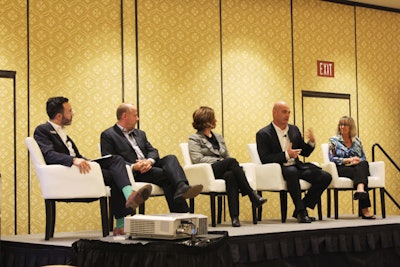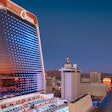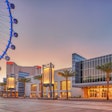
What millennials want from meetings, how new technology is changing the industry, and the economic impact of meetings and events were hot topics at a panel at IMEX America Tuesday. Moderated by Dan Berger, C.E.O. of Social Tables, the panel of industry insiders shared their predictions for these topics and more in a discussion of how meetings and hospitality will evolve in the coming year.
1. Planners are approaching the attendee experience in a more creative way—leading to an increased economic impact for host cities.
Gone are the days when meeting attendees were content inside a hotel ballroom all day. According to the panelists, guests are increasingly interested in exploring the city their event is taking place in, and having a more authentic travel experience at local restaurants and attractions.
“The business that gets done in markets affects more than just the convention center or venue,” says Doreen Burse, vice president of global sales at Marriott. “You’re really seeing more creativity.”
Greg Oates, executive editor of travel- and hotel-industry site Skift, says there is also a growing conversation about giving back to the local community. "The focus is on inclusive innovation," he says. “The city is becoming the venue.”
Steve Enselein, senior vice president of events at Hyatt, built on the idea, saying that hotels and brands are making an effort to embrace local suppliers. “Every time a group comes to our hotels [in different cities], we’re helping support those smaller communities,” he says. “We want people to really experience the location and visit different venues that are unique to the city.”
2. Millennials will continue to change the way events and meetings are planned.
As millennials increasingly become decision-makers, traditional conference formats are being shaken up. Enselein says that younger planners have more of a willingness to create new formats and programming. “Millennial planners—and attendees—want to have opportunities to engage. … They want to have a program that’s ‘tweet-worthy,’” he explains.
Oates think that the life experiences of millennials is what’s driving these changes. “Think about graduating in the last 10 years and how competitive it is—jobs aren’t guaranteed, there was a recession, there was everything after 9/11,” he says. “Events became the professional development pipeline for that generation,” becoming places where face-to-face networking is key.
But Oates and Berger both note that millennials may shy away from more traditional networking events, instead looking for less formal places and activities where they can engage and learn from each other. “Something as simple as renaming a traditional networking reception to a ‘networking session’ can change what the expectations are," says Berger.
Betsy Bondurant, president of Bondurant Consulting, notes that while the hospitality industry has traditionally been a business based on relationships, millennial planners may be evolving that. “They are mixing those relationships with new technology,” she notes, saying that younger planners might be faster to embrace new resources like Airbnb and Lyft, which are further changing the traditional conference model.
3. “Purposeful meetings” is the new buzz phrase, as planners are focusing on clear objectives and holistic wellness.
The theme of this year’s IMEX America was “purposeful meetings”—mainly, planning events with deeper meaning, innovation, and insight in mind. The panelists agreed that this will be a growing trend in 2018.
“A purposeful meeting thinks about all attendees,” says Enselein. “You have to give people choices.” He notes that people learn in different ways, and have different dietary restrictions and different workout routines—and that planners need to consider all of those things when planning a meeting.
“Stop thinking about making a school room for 200 people. Think about those 200 people and what they’re each trying to accomplish,” he suggests, and use that to determine everything from sleeping arrangements and food options to event lighting and seating.
Bondurant says that it will become increasingly important to clearly define a meetings objective—and to share that with everyone involved. Burse agrees, citing Marriott’s “Meetings Imagined” initiative. “It’s an overall strategy about how we approach meetings,” she explains. “We need to understand a meeting's purpose, and tie in elements that help accomplish that purpose.”
4. Technology will continue to make work easier and more exciting.
While event technology has long been a booming industry, Enselein notes that a lot of that tech is focused on sales tools rather than on on-site operations tools. “Every group is looking for cost-cutting measures—everyone has to do more with less,” he says. “If we continue to just focus on the sales side—and don’t use new technology tools to make sure everyone knows what the room should look like—we’ll continue to struggle.”
Berger brings up the idea of “blockchain technology,” which is a decentralized, public ledger of all digital transactions. He believes it could take some of the pain out of monetary exchanges in the meeting industry. “You’ll know that the meeting planner has the budget they say they have. You’ll know the hotel has the inventory they say they have. Everything will be verified,” he explains.
“it’s kind of like taking live inventory,” says Oates.
Purse agrees that blockchain technology will continue to grow and find uses in the industry. “On the sales side, everyone wants a more efficient way to process alternatives forms of payment. Blockchain seems like it could be a really viable option.”
The panelists also agree that artificial intelligence and voice technology will both continue to have a big impact on the industry. “The number-one thing I’ve heard so far at IMEX is, ‘I don’t have enough time to get everything done in a day,'” says Burse. “These technologies will help make the way we work and do things easier and more interesting.”
5. The increased volume of R.F.P.s is the new normal.
The volume of R.F.P.s has grown exponentially in recent years, which Boundurant credits in part to new technology. “Now once we know what a meeting wants to achieve, we can easily send it to 10 or 20 hotels,” she says. “A lot of hotels have developed their own internal processes to triage R.F.P.s and determine what they’ll respond to.”
“We need to find better ways to connect the right planners with the right venues,” notes Berger. Oakes agrees, saying that while there’s a big emphasis on profiling a consumer or attendee, there’s not as much focus on profiling a venue to define its character. “How can we automate that matchmaking service?” he asks.
Enselein does not expect to field fewer R.F.P.s any time soon. “Occupancy is at the highest point it’s ever been,” he notes. “Group demand is so strong right now. If you have a meeting in 2018, I’d start looking for venue space now.”


















